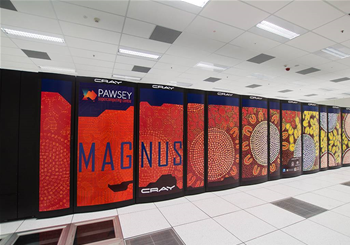The Pawsey Supercomputing Centre is creating a training and support program to help researchers take full advantage of a $48 million supercomputer due to come online in 2022.
The Pawsey Centre for Extreme scale Readiness (PaCER) program targets “grand challenges,” or scientific problems that would not be able to be processed on its current Magnus and Galaxy supercomputers, which will be superseded by the as-yet-unnamed new machine.
Grand challenges accepted into the PaCER program will be worked through over the course of at least three years to ensure research workflows are adequately designed for new generations of high-performance computing (HPC) equipment, with support for algorithm design, code optimisation, and application and workflow readiness.
PaCER is based on a collaborative model involving doctoral or postdoctoral positions, presentations at relevant events, and joint publication opportunities with researchers.
Head of scientific services at Pawsey, Dr Maciej Cytowski, said that PaCER is more than just a compute allocation scheme, but instead a long-term collaboration.
“It is a partnership for collaboration between researchers and Pawsey’s supercomputing specialists,” Cytowski said in a statement.
Dr Amanda Barnard, chair of Pawsey’s Capital Refresh User Group and senior professor of computational science at the Australian National University, said the PaCER program reflects the challenge that new technologies represent to the scientific community.
“The new Pawsey supercomputer, its scale and technology, does not come without its own challenges, and new computer science is needed to maximise its impact,” Barnard said.
“New programming paradigms are emerging, and traditional algorithms must be completely rewritten in order to take full advantage of the machine.
“The Pawsey Supercomputer Centre and Australian researchers now need research about HPC, not just research using HPC, just as they do at the top international supercomputing centres.”


























